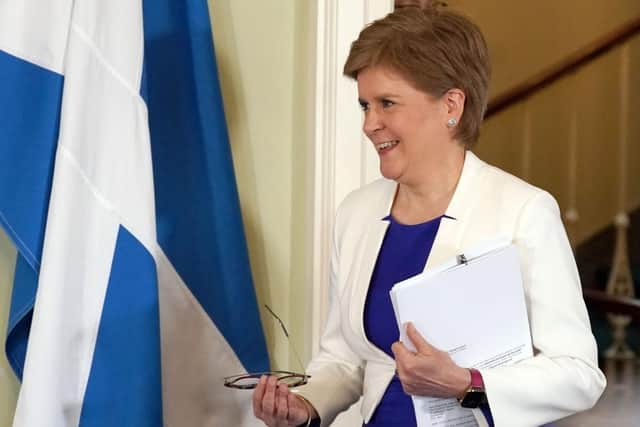Scottish Independence: What is in the Indy economic paper unveiled by Nicola Sturgeon today?
Published today, the third in a series of papers detailing the case for independence includes plans for the economy of an independent Scotland.
Speaking an hour after Chancellor Jeremy Hunt's statement, Nicola Sturgeon said the UK economic model was failing and increasingly holding Scotland back.
Advertisement
Hide AdAdvertisement
Hide AdThe latest paper sets out how independence, combined with Scotland’s economic strengths and resources, can deliver a stronger economy and fairer society.


These are the main topics discussed within the recently published paper.
Currency and fiscal policy
The Scottish Government paper unveiled by the First Minister states it would keep the British pound post-independence "until the time is right to move to a Scottish pound".
However, it is not yet clear when and how this new currency system would be introduced if Scotland becomes independent.
The paper states: “On independence, Scotland would continue to use the pound sterling for a period before moving to our policy of adopting a Scottish pound. The change would take place as soon as practicable through a careful, managed and responsible transition, guided by criteria and economic conditions rather than a fixed timetable.”
Ms Sturgeon said she hoped an independent Scotland could move to a new currency within five years.
The paper also looks at establishing an independent Scottish Central Bank with oversight of monetary and economic conditions in Scotland.
The Scottish Central Bank would also report on the economic criteria and conditions for moving to a Scottish pound.
Advertisement
Hide AdAdvertisement
Hide AdAn “early priority” following a vote for independence would be for the Scottish Government to work with the Scottish Central Bank to design an institutional model and a future approach to financial regulation.
On the issue of fiscal policy, the paper argues Scotland would take a “responsible approach” to servicing a share of UK debt and the sustainable management of offshore revenues.
Ms Sturgeon said Scotland would have a “moral” duty to take on a share of UK debt if it becomes independent.
A robust institutional framework would be established to support the fiscal strategy, according to the paper, with an expanded role for the Scottish Fiscal Commission and a new Debt Management Office.
The paper also argues in favour of a new macroeconomic framework in Scotland to be designed to improve competitiveness and economic resilience.
Building a New Scotland Fund
Up to £20 billion in major infrastructure investment through the Building a New Scotland Fund has been proposed, including investment in more energy-efficient homes, greener transport, better digital and mobile connectivity, and more affordable housing.
The paper argues this fund would be a sustainable use of oil and gas revenues and would last for the first decade of independence, “to enable Scotland to get off to as strong a start as possible and to lay the foundations for a green, fair and net zero economy”.
It adds: “It would also help reduce inequality and support the delivery of our climate targets, thereby accelerating our move to net zero. And it would send a clear signal that Scotland is confident, open and ready to take its place in the world.”
Advertisement
Hide AdAdvertisement
Hide AdA “rigorous process” to assess the value for money of individual investment projects within the fund would be put in place, as well as their compatibility with relevant regimes for controlling state subsidy.
The paper states: “The package would be balanced to ensure that spending supported economic growth while not exacerbating inflationary pressures.”
Trade and Borders
On border issues, the paper indicates the Scottish Government wants to retain free movement of people, without a passport, across the UK and Ireland, with trade borders implemented “smoothly”.
The proposals also include re-joining the European Union (EU) "to benefit from, and contribute to the vast European single market”, which the Scottish Government claims helping to forge a different path to the UK system.
Rejoining the EU could open up “potentially enormous” economic opportunities, according to the paper, as it cites the value of Scotland’s manufactured goods exports to the EU and the rest of the world (£19bn) was higher than the value of exports to the rest of the United Kingdom (£11bn). The paper states: “In contrast, Brexit is damaging trade both within and outwith the EU.”
Other proposals outlined
A redesigned energy market that aims to provide secure and reliable low cost energy has also been included in the plans.
In an independent Scotland, using full powers over employment law to help improve pay and working conditions for people across Scotland would be introduced, including introducing a minimum wage with a single rate for all age groups and stronger access to flexible working.
A plan for better industrial relations through a social partnership approach involving business and unions has also been proposed, as well as a migration policy tailored to Scotland’s needs and designed to boost the working population.
Advertisement
Hide AdAdvertisement
Hide AdThe paper concludes: “With independence, Scotland can fulfil its potential. We can build on our world-leading strengths. We can deliver a stronger economy for a better country.”
To read the full paper, Building a New Scotland: A stronger economy with independence, click here.
Comments
Want to join the conversation? Please or to comment on this article.